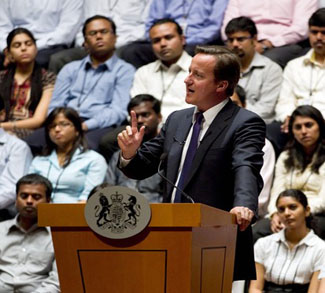Thuntee Ruben Sukchotrat, Director of Digital Transformation for the Thai Sang Thai Party, is a digital democracy revolutionary. Sukchotrat sees the income inequality in his nation as a sign that his people have not had a proper voice in setting and implementing public policies. And he believes that building a technology-based future should begin in the nation’s schools.
The timing for such ‘art of the possible’ thinking is right – The Thai Constitutional Court is debating term limits for its leadership, one that has arguably lost the trust of its citizenry; the Thai economy is in poor shape; and the once disillusioned are slowly sowing the seeds of forming a movement of tangible change.
The heavy military influence in Thai politics, made semiofficial under the current constitution, is becoming increasingly unpopular with the more liberal, progressive younger generation – a voting bloc courted by the Thai Sang Thai party. But a challenge lies in that younger Thais can be slower to adapt to such seismic societal change envisioned.
Sukchotrat however wants to provide citizens with digital tools to gain direct access to government services and what is more, to provide input on government policy. Government bureaucrats, he says, often obfuscate rather than speak plainly to citizens.
He joined the fledgling political party at its outset to better position himself to promote this vision.
By accessing the metaverse citizens, Sukchotrat says, ordinary citizens can become more active participants in their governance and ensure that governments both in Thailand and worldwide can better serve their employers (the citizenry). Just as importantly, citizens who believe that their views can impact public policy and performance are incentivized to better inform themselves about public affairs.
It’s a win-win.
“Having been a fan of ‘efficiency’ since childhood,” he adds, “we have been thinking of ways to reach our goals as quickly as possible, with as few resources as possible, based on the right rules.” Digitalization is the future, he contends, and failure to modernize access to forms, applications, and other ways that people communicate with government wastes time and resources and costs the nation and its people financially.
But, he cautions, most of the 80 percent of Thais who own smartphones do not yet know how to use them strategically to get ahead in their daily lives and businesses – or to solve their government-related issues. Sukchotrat has been touting a long-term plan to provide that knowledge, political literacy and empowerment if you will, to Thai citizens.
In his view, the nationwide effort to increase the level of such literacy should begin with teaching young students the principles of using, understanding, and creating technical fluency needed to engage with computers and the Internet. A second step is to create specially designed programs to enable adults to build skills and gain the necessary knowledge to enhance their horizons in the job market.
Sukchotrat knows the value of digital literacy from his own experience. After graduating from a Thai university, he spent several years in Texas, earning a Ph.D. in data mining from the University of Texas at Arlington. After working as a researcher for Expedia.com, Sukchotrat returned to Thailand armed with finely honed data mining skills.
Back home, Sukchotrat got a government job helping citizens with tax planning and solutions for tax filing. Then, he began to formulate ideas for using technology to make his government more efficient and less corrupt. Upon leaving government service, he became CEO of Legal Drive Co., Ltd., the owner of iTAX, the leading personal income tax solutions provider in Thailand.
When he saw how poorly the Thai government was managing its response to the COVID-19 pandemic, Sukchotrat decided to embark on a political career. He lamented delays in vaccinations and vaccines, businesses shutting down due to lack of communications and government support and frankly, watching friends and family dying – “I could not any longer just sit back and watch.”
The newly formed Thai Sang Thai Party attracted his attention, and party leaders were receptive and quick to put his digital skills to work. His interests in revitalizing the nation by marshalling the skills of the emergent generation aligned with those of both party founder and leader Khunying Sudarat Keyuraphan (formerly the Pheu Thai party’s chief strategist) and Policy Center Director Tidarat Yingcharoen (Tida).
Tida says her new party hopes to recruit older Thais as “foundations” to enable the youthful party leaders to bring in a diversity of ideas to better serve the people’s needs and viewpoints. Most bureaucracies (in and out of government) are so hierarchical that they stifle new ideas and the energetic young leaders that could help them reach their full potential.
Tida conversely notes that the party, while led by a former prime minister candidate of the nation’s largest political sect, is staffed by a coterie of young, dynamic, collaborative activists with a zeal for equitable treatment for all Thai citizens.
The ongoing suppression of political parties in Thailand should not stymie Thai Sang Thai, she says.
One of Sukchotrat’s new initiatives is to unionize the nation’s gig economy workers. He unveiled such a strategy at the Thailand Metaverse Expo 2022 in Bangkok in August. Such innovative thinking is direly needed – Thailand’s GDP growth is now the lowest in the ASEAN, the nation is lacking in investment and cannot compete with nearby countries in exports. And as Thai society ages, there is a growing labor shortage that has impacted small organizations and independent (gig) workers the hardest.
Through a labor union, Sukchotrat believes, gig workers can raise their incomes, reduce costs, and better utilize technology and innovation to build personal stability. A union structure would enable gig workers to get affordable health insurance, have better access to legal and other services, and protect their independent status and flexibility.
Union backing could also help them obtain loans and other banking services more readily and at better rates. And the union could offer training for members to improve their job skills and enable younger workers to move up into better jobs over time.
The gig worker union initiative also dovetails with Thai Sang Thai’s overarching vision for liberating and empowering “small people” who are the foundation of the Thai economy – Yet another example of Sukchotrat’s next-generation vision of rebuilding (and retooling) the nation from the bottom up.
The views expressed in this article belong to the authors alone and do not necessarily reflect those of Geopoliticalmonitor.com




